Podcast
Join us as we explore ideas that matter and hear from experts across various fields.
Expert Guests
Listen to our guests share their experiences and insights on important topics.
Diverse Topics
From financial Inclusion to empowerment our podcasts delve into a wide range of subjects.
S01 E13
Designing Inclusive Financial Solutions: Pricing and Product Tweaks that Create Stickiness
S01 E12
From Energy to Equity: Leveraging the Pay-As-You-Go Model for Financial and Economic Inclusion
How does a simple payment model unlock financial dignity, expand economic opportunity, and transform underserved communities? In this episode of the EFInA Podcast, host Immanuel Umukoro, Policy and DFS Manager, EFInA, sits with Kolawole Osinowo, CEO, Izili Group, to unpack the powerful intersection between energy access and financial inclusion, exploring how the Pay-As-You-Go (PAYG) model is reshaping the future of clean energy adoption across Africa and emerging markets. This is an episode you can’t afford to miss. Tune in and discover how energy access can be the gateway to true economic equity.
S01 E11
POS Terminals, Agent Banking, and the Inclusion Agenda: Looking for the Silver Lining
As Nigeria deepens its push for financial inclusion, POS terminals and agent banking have become critical lifelines for last-mile communities. But with rising transaction and operational costs, fraud risks, liquidity struggles, poor connectivity and frequent service downtimes, can we collectively unlock broader financial access, resilience and trust? In this episode of The EFInA Podcast, host Immanuel Umukoro (Policy and DFS Advocacy Manager, EFInA) sits with Mr. Fego Okiomah, Country Manager at Newland NPT, to unpack the evolving realities of Nigeria’s agent banking ecosystem. From the CBN’s new terminal geo-tagging policy to emerging opportunities for innovation, regulation, and consumer trust, this conversation explores where the silver linings really lie.
S01 E10
Open Banking in Nigeria: Why Should Nigerians (especially the Unbanked and Underbanked) Care?
In this episode, we sit with Mr. Adedeji Olowe, Trustee of Open Banking Nigeria, to demystify the concept. We explore how secure data sharing can unlock safer, more personalised financial services, foster transparency, and drive financial inclusion for millions who remain underserved. With Nigeria leading the way as the first African country to establish a regulatory framework for open banking, this conversation sheds light on its transformative potential and why it matters for your financial future.
S01 E09
Protecting Invisible Victims and the Most Vulnerable in Nigeria’s Financial Services Ecosystem
In Nigeria’s rapidly evolving financial services landscape, millions of consumers remain at risk—especially the invisible victims and the most vulnerable groups who often fall through the cracks of protection. From unfair charges to predatory practices and digital exclusion, their voices are rarely heard, yet they bear the brunt of systemic gaps. In this episode of the EFInA Podcast, we sit down with Sola Salako-Ajulo, President of the Consumer Advocacy Foundation of Nigeria (CAFON), to unpack the urgent question: What must regulators do to safeguard the most vulnerable in our financial ecosystem? Building on insights from the recent webinar, this conversation explores the ecosystem’s expectations of regulators, the realities of consumer protection, and the pathways to building a financial system where fairness, trust, and inclusion are non-negotiable.
S01 E08B
Credit Literacy, Personal Finance & Financial Health: Understanding & Managing your Credit Appetite
In Part 1 of our two-part episode on Credit Literacy, Personal Finance, and Financial Health, we navigated the nuances of credit and its impact on financial well-being. Building on those insights,
This episode (Part 2) dives into understanding and managing your ‘credit appetite’ – _how to thoughtfully approach credit use, balance financial opportunities with risks, and cultivate healthy credit habits for long-term financial stability.
S01 E08A
Credit Literacy, Personal Finance and Financial Health Part 1: Navigating Credit Nuances |
In Nigeria, rising access to digital credit, informal lending, and consumer finance has not been matched by adequate credit education. At the same time, financial stress—due to poor saving habits, impulse spending, and income unpredictability—has weakened financial health among millions. This 2-part series of the EFInA podcast seeks to enhance awareness and understanding of credit and how to manage it. The discussion also touches on responsible and ethical lending, fostering the conversation around better credit use and financial habits that can improve the overall financial well-being of Nigerians.
S01 E07
Designing for Her: Gender-Intentional Product Design
In Nigeria and across Sub-Saharan Africa (SSA), women continue to face significant barriers to financial inclusion. Despite contributing significantly to household welfare and local economies, particularly through micro and small businesses, women often lack access to credit, savings tools, insurance, and digital financial services. In this episode, we dive deep into women micro-entrepreneurs access to and usage of appropriate financial solutions through ‘Gender-Intentional Product Design’— what it is, why it matters, and how it can be the game-changer for millions of women micro-entrepreneurs in Nigeria and across Sub-Saharan Africa with Ms. Olajumoke Daramola, Specialist, Advisory Services, Africa at Women’s World Banking. We share insights on issues and opportunities around pro-poor product innovations, exploring how gender-responsive financial products/solutions can empower women micro-entrepreneurs through expanded access to and usage of appropriate financial solutions that drive inclusive and enterprise growth.
S01 E06
Designing for Women, Empowering Households and Communities.
In this episode, we explore how gender-responsive financial products/solutions can empower women, strengthen households, and drive inclusive growth with Mustapha Otaru (Chief Product Officer, Sterling Bank). The conversation highlights barriers women face in accessing financial services, best practices in designing for their unique needs, and the broader socio-economic benefits of women’s financial empowerment through gender-responsive product innovation.
S01 E05
Breaking the Silence on Consumer Dispute Reporting & Resolution in Nigeria’s DFS Ecosystem.
According to EFInA’s 2023 Access to Financial Services in Nigeria Survey (A2F) Report, negative perceptions, informed by bad experiences and fraud, have been a significant deterrent to formal financial inclusion, leading to a lack of trust in financial institutions and restraint in engaging with formal banking systems. This lack of trust has significant implications for Nigeria’s digital economy, where the success of digital financial services (DFS) hinges on consumer confidence and security. Fraudulent activities, including identity theft, phishing scams, and unauthorized transactions, erode trust and discourage individuals, particularly those in underserved communities, from fully adopting digital payment systems and financial products. In this episode, The conversation with Mr Ajibade Laolu-Adewale (Chairman, CeBIH; and Group Head, Partnerships, Digital Solutions and FINTECHs in WEMA Bank) seeks to answer the question, “How can Nigeria effectively report their grievances with FSPs and get satisfactory redress to build confidence in the system, leading to higher DFS updates and, ultimately, driving financial and economic inclusion
S01 E04
Tackling Digital Fraud and Protecting the Most Vulnerable in Nigeria’s Digital Economy
Quick Fact: Negative perceptions, informed by bad experiences and fraud, have been a significant deterrent to formal financial leading to a lack of trust in financial institutions and restraints in engaging with formal banking systems.
Why is it important? Lack of trust has significant implications for Nigeria’s digital economy, where the success of digital financial services (DFS) hinges on consumer confidence and security. Fraudulent activities, including identity theft, phishing scams, and unauthorized transactions, not only erode trust but also discourage individuals, particularly those in underserved communities, from fully adopting digital payment systems and financial products.
In this episode, we discuss with Prof. Chiso Ndukwe Okafor, Executive Director of the Consumer Advocacy and Empowerment Foundation (CADEF), Nigeria, on the root causes of digital fraud, the structural vulnerabilities that expose at-risk populations, and the proactive measures necessary to fortify consumer protection and build trust in Nigeria’s rapidly evolving digital financial landscape.
S01 E03
Digital Innovation in Financial Services and Last-mile Service Consumption
Quick Fact: 26% of Nigerians remain financially excluded, many of whom are women, youth, and people in rural communities, who form the largest segment of last-mile consumers.
Why it is important: Digital innovation in digital financial services (DFS) has significantly reduced financial exclusion and can bridge gaps in access to essential services. However, adoption among last-mile consumers remains hindered by low digital literacy, limited technology access, and security concerns.
In this episode, we discuss with Mr. Olu Akanmu, EFInA Board Director and Academic Director, Tech-Leap Initiative, Lagos Business School, the benefits and pitfalls of digital innovation in driving financial inclusion for the last mile, especially as digital innovation is leapfrogs at a pace faster than social development.
S01 E02
Financial Inclusion and Economic Empowerment: Priorities for Nigeria
S01 E01
Financial Innovation & Access: The Consumer’s Threat
Quick Fact: In 2023, 45% of Nigerians used digital financial services (DFS) to meet their financial needs, up from 34% in 2020.
Why it is important: As Digital Financial Services (DFS) users increase, new risks emerge for inexperienced consumers. These issues reduce the trust quotient in the market and pose a significant threat to financial inclusion, which is built on trust.
On this episode, we discuss with Oluwatomi Eromosele (PHD), a development economist expert who currently serves as EFInA’s general manager and Research lead, to discuss the increasing threat of risk exposure to consumers due to the growing adoption of digital financial services










